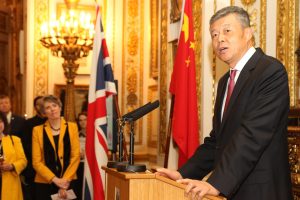Recent years have shown the United Kingdom to be one of Beijing’s most eager European partners. Hailed by then-Prime Minister David Cameron in 2015 as embarking on a “golden era,” the countries’ burgeoning links have allowed Britain to strengthen its position as the continent’s number one destination for Chinese investment. Such success has been driven by successive Conservative Party administrations’ careful “decoupling” of economics from sensitive political issues between the two powers. This allowed lucrative market relations to weather several diplomatic storms. For example, while former Foreign Secretary Jeremy Hunt threatened “serious consequences” would follow a crackdown on last year’s Hong Kong protests, he was simultaneously keen “to preserve the great relationship between the U.K. and China.” This delicate approach has even allowed Huawei a supporting role in Britain’s fledgling 5G infrastructure, with not even the wrath of Donald Trump able to separate the U.K. from such comfortable contradictions.
The COVID-19 crisis, however, may prove to be a turning point for this political balancing act. As of April 28, the U.K.’s National Health Service had registered over 21,600 deaths as a result of the virus first reported in Wuhan, China. According to public health experts this situation shows no sign of ending as lockdown restrictions potentially look set to last until autumn. Of course, this development will have unavoidable ramifications for a bilateral relationship so characterized by discrepancies, with an unprecedented health emergency seemingly pushing London’s desire to accommodate Beiijing’s market power to the breaking point.
This is evident from the aggressive new line taken by Downing Street officials in recent weeks, now a far cry from the 2019 “pro-China” rhetoric of Boris Johnson, who has only just recovered from infection himself. Leading minister Michael Gove was one of the first to pioneer this approach, stating in late March that “some of the reporting from China was not clear about the scale, the nature, the infectiousness of [COVID-19.]” This has only given way to stronger threats to fully reset bilateral links, as Foreign Minister Dominic Raab recently declared that “We can’t have business as usual.” British intelligence agencies appear to have provided the impetus behind this abrasive approach, arguing that “strategic industries” believed to be vulnerable to Chinese infiltration now ought to be blocked from potential take-overs.
This rapid transformation has even resulted in the creation of a new “China Research Group” within the Conservative Party. Headed by prominent Beijing critic Tom Tugendhat, the group’s creation exemplifies the rising fortunes of “China hawks” within the British political establishment. These voices appear eager for a “reckoning” with a Xi administration allegedly at risk of becoming a “pariah state.”
As this confrontational approach is met by equally hawkish retorts from a new generation of Chinese diplomats, however, questions must be asked as to whether this rhetoric will simply amount to a war of words. Naturally, while politicians squabble, demand continues unabated for personal protective equipment (PPE), much of which is produced in mainland China. This reality was recently addressed by the British embassy in Beijing, which, rather than discourage trade, simply laid out guidelines for businesses wishing to conduct activities with Chinese firms. Such advice seemingly hints at the “structural power” of relations between two influential markets, which may simply prove too important to jeopardize.
Events such as this will naturally give a U.K. government, now renegotiating its China policy, much to think about in the coming months. While it has been consigned to the political wilderness in such testing times, it must be remembered that Britain is still officially set to leave the European Union in its entirety at the end of the year. A potential free trade deal with Beijing, therefore, may still appear highly appealing to a powerful economy desiring to make the best of looming uncertainty. At the same time, an agreement would also help restore face for the Chinese Communist Party amid global backlash, with the government eager to bolster its tarnished image as an international leader.
Overall, it is clear that the future of Britain and China’s relations remains as unpredictable as the virus that has caused it so much difficulty. As tempers flare, what appears to be an irreconcilable crisis now may simply prove to be yet another dispute in a relationship that has long been as confrontational as it is cooperative.
Niall Gray is a master’s student of Central and East European, Russian and Eurasian Studies at the University of Glasgow.

































